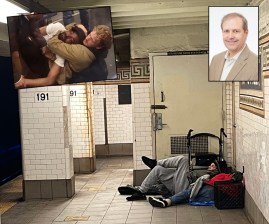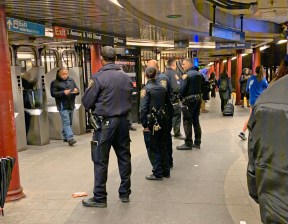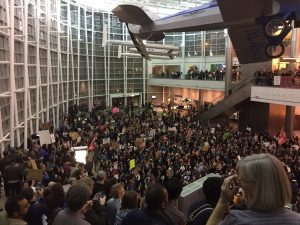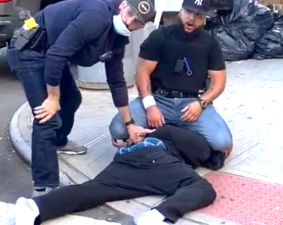Op-Ed: More Bus Lanes, Fewer Police Cars!
The violent response to the protests has thrown a harsh light on the city's budget priorities. They must change.
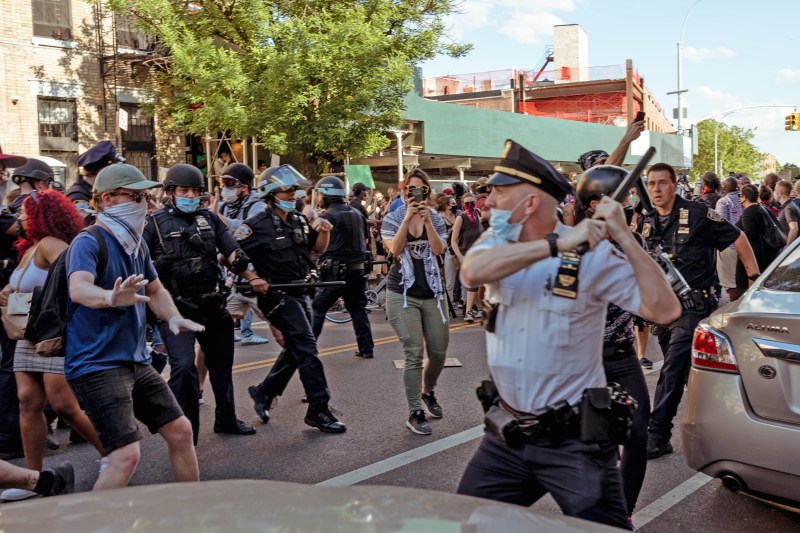
In recent days, a powerful chorus of New Yorkers joined together in solidarity against police violence and demanded official accountability. In response, police met protesters with batons, tear gas, rubber bullets, and other weapons. At one point, officers weaponized their multi-ton patrol SUVs, ramming through crowds of people.

The police department owns about 10,000 vehicles. And on top of that, the city plans to spend over $80 million dollars in upgrades to the NYPD fleet over the next five years. Meanwhile, while leaving policing intact, Mayor de Blasio has cut millions of dollars in social-service, transit, and environmental programs. Hundreds of advocacy organizations have come together this spring under the banner of Communities United for Police Reform and #NYCBudgetJustice to demand that the mayor reverse course.
After days when the misuse of tax-funded resources has been on gross display by police, our call for fiscal fairness should be even more palpable. Among the mayor’s proposed cuts, $7.9 million will be diverted from the Better Buses program and new bus lanes this year and next. This would halve the pace of bus lane installation. In context, to restore the bus lane budget cut, it would cost at most half of what the city plans to spend on police vehicles this year alone.
This action is regressive and short-sighted. Bus riders are overwhelmingly low-income New Yorkers of color. And it comes at a time when buses are critical: according to TransitCenter, 47 percent of New York City bus riders are essential workers. That helps explain why bus ridership dropped the least of any MTA service in recent months and actually outpaced subway ridership in April. With COVID and all the inequities the pandemic has laid bare, the city’s bus lane program is more important than ever.
As the city reopens, Mayor de Blasio must revise his budget. He should cut police resources, which have remained untouched despite an extreme deficit, and invest instead in equity and public health. The Better Buses program not only puts bus riders first on city streets, but also helps reduce air pollution that worsens respiratory illnesses like COVID. Given the horrific racial disparity of COVID health impacts, safer air to breathe is a moral imperative for New York.
The mayor should accelerate bus lanes to improve access and mobility for New Yorkers who need it most. Cutting programs like Better Buses, the Summer Youth Employment Program, and countless other social, environmental, and educational initiatives while leaving a tremendous NYPD budget whole does not leave our city safer or more equipped to recover. It allows the criminalization of black and brown communities to continue and sacrifices the true investments that tie the city together and lead to community safety and belonging. Policing the city primarily from the inside of 10,000 vehicles inevitably pushes police and community members apart, all the more so when at the expense of the programs and community supports that have been cut this budget cycle.
We demand full accountability for those involved in this weekend’s abuses of power and privilege. We call for a genuine de-escalation of police violence on city streets, on our buses, and in the subway system and other public spaces alike.
Accordingly, we also reiterate our demand that Gov. Cuomo cancel plans to expand the MTA police force and instead invest in bus, subway, and paratransit service. Last fall, we argued that more frequent service would mean less time on lonely platforms and packed trains. Now, more service means less crowding in a transit system that must rebuild a devastating loss of public confidence inflicted by COVID. More police won’t encourage riders back to subways and buses nearly as much as more service and less crowding.
"If police budgets bought peace, the $6 *billion* NYPD budget would’ve bought the most sophisticated de-escalatory operation in the world. Clearly, it didn’t." – @AOC We can and MUST do better. #DefundNYPD #NYCBudgetJustice https://t.co/wJFkeSgdwB
— Communities United for Police Reform (@changethenypd) June 2, 2020
In all of this, spending for bus lanes and patrol cars may seem insignificant. But the larger forces at play in this budget threaten to consume us. New Yorkers are rightfully protesting a system that empowers police over communities of color. Protests come now on the heels of a pandemic that disproportionately devastated New York’s black and brown communities.
The same system that allows police to kill people of color with impunity has allowed black and brown community members to suffer the worst of COVID. It’s that one system that we must struggle to reform piece by piece.
It might not be comfortable for those of us who have most benefited from this system to acknowledge it. But it’s our responsibility. If we take those hard steps and we open our ears to the voices we should have been listening to all along, we have a chance to build a more just and equitable New York. If not now, when?
